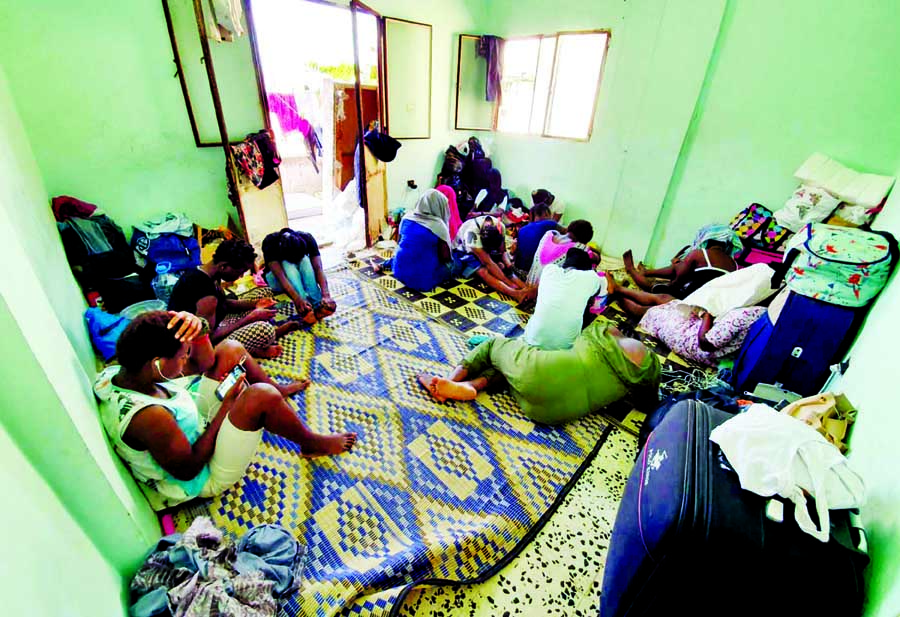
Noman Mosharef :
Thousands of Bangladeshi migrant workers in Lebanon are passing days in immense hardship since the Gulf nation plunged into economic crisis last year, which driven most of them into unemployment.
The Beirut explosion further compounded sufferings of the migrant workers as many of them living in the damage radius of the explosions- particularly in Geitawi, Bourj Hammoud and Ras El Nabaa neighbourhoods- have lost their earnings
and homes.
International Organisation for Migration (IOM) estimates that roughly eight per cent of the estimated 300,000 people affected in Greater Beirut are migrant workers, primarily from Ethiopia, Bangladesh and the Philippines. At least 150 migrant workers have been injured and 15 died in the explosion.
Sources said, around 1.5 lakh Bangladeshis are working in Lebanon, nearly 30,000 of them are undocumented.
Half of the workers have already lost their jobs and who are in work have already faced pay cup by two third of their salary following the economic crisis in Lebanon.
Worried about their fate, Bangladeshi workers in Lebanon appealed for urgent repatriation. However, Expatriates’ Welfare and Overseas Employment Minister Imran Ahmad said, bringing back all them is quiet impossible at this moment. “It is not possible to bring them back suddenly. But the ministry is seriously thinking to make a way out to repatriate them,” Imran Ahmed told a TV channel on Monday.
He said it is the responsibility of recruiting agencies and employers to send back the workers from Lebanon.
Dr. Tasneem Siddiqui, Founding Chair of Refugee and Migratory Movements Research Unit (RMMRU), told The New Nation on Tuesday, “The deadly Beirut explosion has further worsened the Gulf nation’s economic crisis leaving Bangladeshi migrant workers at immense risk. The situation is worst for Bangladeshi domestic workers who have become homeless after their employers or sponsors declared them abandon amid economic crisis in Lebanon.”
“The government should take up the issue and devise plan to bring back the trapped Bangladeshi migrant workers in Lebanon. The Bangladesh embassy in Beirut should also make necessary arrangement to ensure welfare of our citizens,” said Dr. Tasneem Siddiqui, also a Professor of Political Science at the University of Dhaka.
The shortage of US dollars in Lebanon started months ago prior to the Lebanese uprising in October 2019, leading to an economic crisis and the rapid devaluation of the Lebanese currency, Lira. The currency has lost 70 per cent of its value since October, with skyrocketing unemployment and the tripling of prices of many essential goods.
The crisis has severely impacted migrant workers, particularly domestic workers. Migrant domestic labour in Lebanon is regulated through the Kafala (sponsorship) system, which enables abuse and exploitation of workers by requiring them to obtain their work and residency permits through their employers.
Currently, about 80,000 Bangladeshi female workers are working in Lebanon, most of them work as domestic help.
Mohamad Elahi, one of the migrant workers, told media that he has not sent money to his wife and two daughters in Bangladesh for months after his company stopped payment amid economic crisis in Lebanon.
“My family cries a lot,” he said. “They can’t pay school fees, can’t buy enough food.”
Elahi said most of Bangladeshi workers have already lost their jobs and the future in Lebanon remains uncertain. “In this situation, I want to leave like most other Bangladeshis. Our government should make the arrangement immediately,” he added. Health officials in Beirut say at least 200 people have died from the explosion caused by 2,750 tonnes of ammonium nitrate in Beirut port. At least four Bangladeshi nationals were killed and 21 were injured in the blast.
Sharing his experience, one of the affected Bangladeshis Idris Ali said, he was eating on the floor in a room that he shared with four other people in downtown Beirut when he heard the first blast.
Sitting cross-legged and enjoying his only meal of the day, he began to feel the shaking.
When it began, he grabbed his towel and walked towards the window to figure out what was going on. The next moment felt like a blur. He remembers the silence before he was thrown into the air.
“I got up shaking, thinking my life was all over,” recounts the migrant worker to Middle East Eye. “I then ran downstairs and just saw glass. Everyone was crying. People were bleeding.”
One week on and Ali is more desperate than ever to do one thing : Go home to Bangladesh.
Having come to Lebanon with the hope of supporting his son, he was already in distress when the country’s economic crisis took hold. Ali lost his job, his home, and was unable to feed himself.
He then relied on the good will of others and ended up sleeping on the floor of a Bangladeshi domestic worker who took him and others in. But nothing prepared him for Beirut’s port explosion.
“I still wake up shaking, thinking that my life is going to end,” says Ali. “We all just sit here frozen in shock. Many Bangladeshis worked in the port and if it had happened an hour earlier, it could have been my friends. The stress of everything is making me want to leave even more.”
Ali was fortunate. He did not sustain significant injuries. Like Ali, he wants to leave Lebanon, but is unable to do so because he can’t afford to pay for the flight back home.
“It feels like I’m living in a movie. Never in my life did I imagine going through something like this,” said Shahid, who refused to give his surname due to fears for his safety.
“My boss fired me and didn’t give me six months’ worth of salary. He tried to pay me in Lebanese pound instead of dollars. But even if I had been paid, it would not have been enough for a plane ticket home to Bangladesh.”

